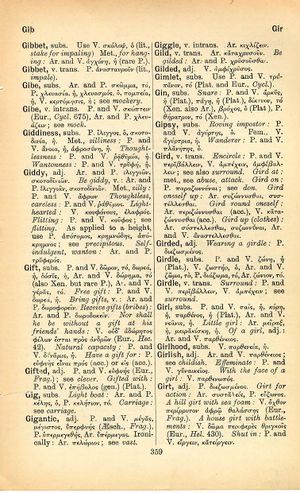gird: Difference between revisions
From LSJ
λόγος γέ τοί τις ἔστι τῶν γεραιτέρων, ὅσ' ἂν ἀνόητ' ἢ µῶρα βουλευσώµεθα, ἅπαντ' ἐπὶ τὸ βέλτιον ἡµῖν ξυµφέρειν → there is in fact a saying among the elders, that whatever thoughtless, stupid decisions we make, they all turn out for the best for us
m (Woodhouse1 replacement) |
mNo edit summary |
||
| Line 13: | Line 13: | ||
[[gird round oneself]]: [[Aristophanes|Ar.]] [[περιζώννυσθαι]] (acc.), [[verse|V.]] [[καταζώννυσθαι]] (acc.). | [[gird round oneself]]: [[Aristophanes|Ar.]] [[περιζώννυσθαι]] (acc.), [[verse|V.]] [[καταζώννυσθαι]] (acc.). | ||
[[gird up]] ([[clothes]]): [[Aristophanes|Ar.]] [[ | [[gird up]] ([[clothes]]): [[Aristophanes|Ar.]] [[συστέλλεσθαι]], [[συζωννύναι]], [[Aristophanes|Ar.]] and [[verse|V.]] [[ἀναστέλλεσθαι]]. | ||
}} | }} | ||
Revision as of 17:35, 4 June 2020
English > Greek (Woodhouse)
verb transitive
encircle: P. and V. περιβάλλειν, V. ἀμπέχειν, ἀμφιβάλλειν; see also surround.
gird at: met., see abuse, attack.
gird on: P. παραζωννύναι; see don.
gird oneself up: Ar. συζώννυσθαι, συστέλλεσθαι.
gird round oneself: Ar. περιζώννυσθαι (acc.), V. καταζώννυσθαι (acc.).
gird up (clothes): Ar. συστέλλεσθαι, συζωννύναι, Ar. and V. ἀναστέλλεσθαι.

